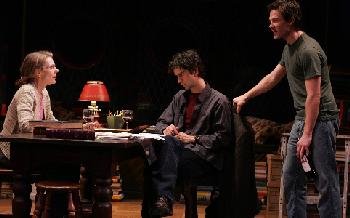SITE GUIDE
REVIEWS
FEATURES
NEWS
Etcetera and
Short Term Listings
LISTINGS
Broadway
Off-Broadway
NYC Restaurants
BOOKS and CDs
OTHER PLACES
Berkshires
London
California
DC
Philadelphia
Elsewhere
QUOTES
On TKTS
PLAYWRIGHTS' ALBUMS
LETTERS TO EDITOR
FILM
LINKS
MISCELLANEOUS
Free Updates
Masthead
Writing for Us
A CurtainUp Review
The Busy World Is Hushed
by Les
Gutman
|
I want my windows free of stain. ---Hannah |
 J. Clayburgh, H. Linklater and L. MacFarlane
(Photo: Joan Marcus) |
With The Busy World is Hushed, Playwrights Horizons presents its third play by Keith Bunin in five years. This is the sort of play that validates that level of commitment to this thoughtful young playwright.
The surface of Busy World covers familiar territory: a woman hiring an assistant to help her write a book, the same woman trying to deal with her son in his late twenties who has not yet settled down and the "dance" that slowly develops (for a surprising reason) between the assistant and the son (both gay) that completes the play's triangulation. But Bunin has far loftier aspirations than this schematic suggests. The play (its title drawn from an Episcopal prayer) is about faith and doubt -- what one believes, how one comes to beliefs and why one believes. Or doesn't.
Hannah (Jill Clayburgh) is an Episcopal minister and religious scholar. Having acquired the text of an ancient, unknown gospel text that may well antedate the extant gospels, she is to write a book about its possible implications for current Christian theology. Brandt (Hamish Linklater), a young writer, is to help her. After some pushing and pulling about their respective views on religion (he is, more or less, an agnostic), she hires him. As it happens, he is undergoing his own set of trials and tribulations -- his father has just been diagnosed with a brain tumor -- and his feelings about the meaning of life are being, for the first time, brought into high relief.
Hannah's son, Thomas (Luke MacFarlane), is the quintessential lost boy whose adult life has consisted of floating from one thing to the next without ever stopping for long at any of them. He disappears from Hannah's life unannounced and without communication and, with an equal lack of ceremony, returns periodically. One such return (a messy one) occurs during Brandt's interview. As the two young men become better acquainted over time, it develops (a) that there is some sexual energy between them which Brandt short-circuits because of his father's condition and (b) that behind Thomas's vagabond life are his own set of issues that make him question what he can believe.
Bunin has neatly positioned these three truth seekers in close formation so as to permit an exploration of the sometimes complex philosophical questions he has on his mind in real-life terms. That said, his elegant writing style presents a challenge to actors. One can believe that Hannah's training in homiletics has accustomed her to speaking in such a fashion, and that Brandt's chosen profession has also equipped him to speak not only in complete sentences but complete thoughts. It's a tougher road to buy Thomas's heightened dialogue, especially in the second act when emotions become elevated.
Clayburgh succeeds in blending Hannah's starchiness with a very natural vulnerability. Linklater does a superb job of conveying Brandt with easy articulation yet also with a substantial dose of anxiety. MacFarlane is fine at developing Thomas's kinetic nature, but falters when he must speak Bunin's speech: I found it impossible to accept that he was doing anything other than reading someone else's words.
Mark Brokaw's direction is impeccable and nonetheless practically invisible. Allen Moyer's set, many elements of which are dictated by the script, is entirely apt and functions well. The same is true of Michael Krass's keenly observed costume choices and Mary Louise Geiger's lighting. Unfortunately, I can't say the same for Lewis Flinn's choice of music which would have been more appropriate had Hannah taken up a life as a new age guru.
Keith Bunin's program note provides useful information on what brought him to take this particular journey. Though one never senses that he is proselytizing the audience -- or indeed that he has found any answers he's prepared to preach about -- what he has given us makes us pleased to have been along for the ride.
|
The Busy World Is Hushed
by Keith BuninDirected by Mark Brokaw with Jill Clayburgh, Hamish Linklater and Luke MacFarlane Set Design: Allen Moyer Costume Design: Michael Krass Lighting Design: Mary Louise Geiger Original Music and Sound Design: Lewis Flinn Running time: 2 hours with 1 intermission Playwrights Horizons, 416 West 42nd Street (9/10 Avs) Telephone (212) 279-4200 Opening June 25, 2006, closes July 9, 2006 TUES - SAT @8, SAT @2:30, SUN @2:30 & 7:30; $65 (with $20 tickets for those under 30, $15 for students, both 1 hour before performance) Reviewed by Les Gutman based on 6/24/06 performance |

6, 500 Comparative Phrases including 800 Shakespearean Metaphors by our editor.
Click image to buy.
Go here for details and larger image.






